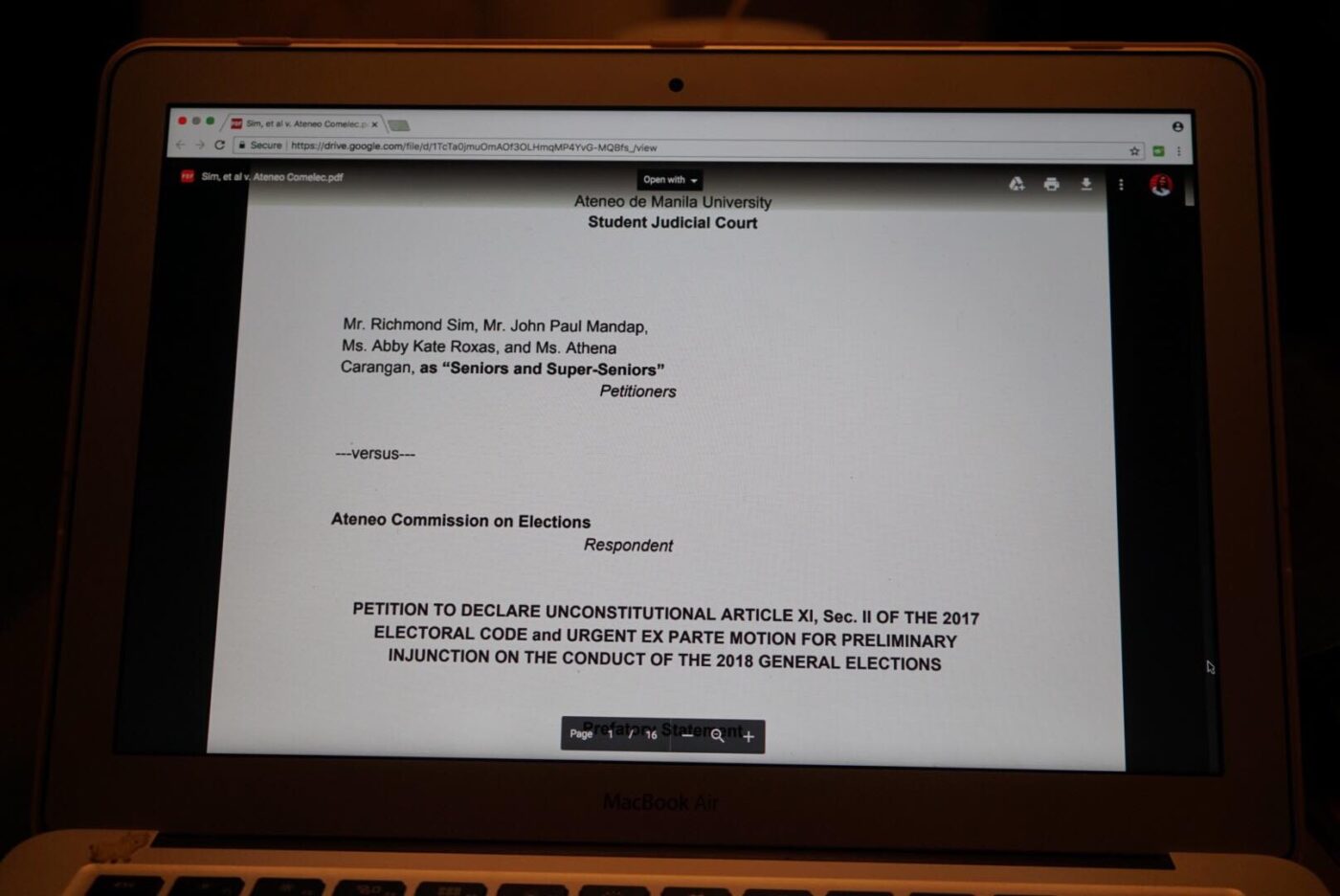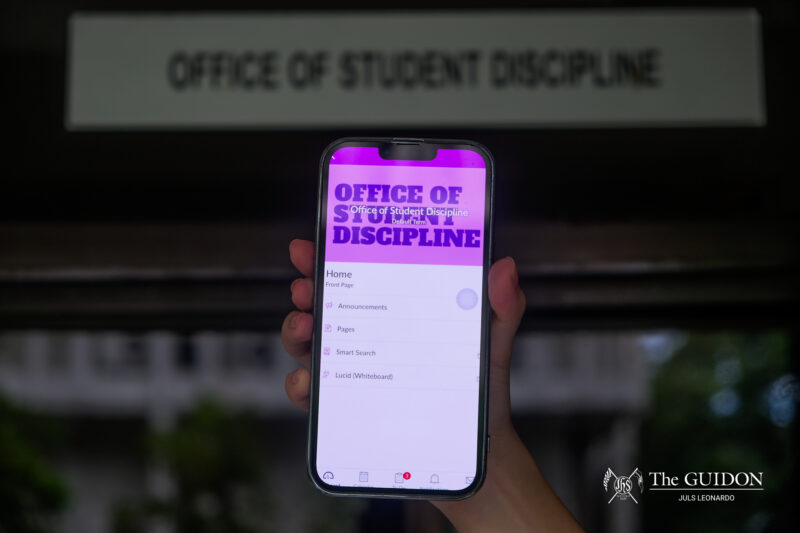GRADUATING STUDENTS were not allowed to vote in the recently-concluded Sanggunian elections as the Ateneo Student Judicial Court (SJC) decided against a petition from a group of students claiming to represent seniors and superseniors.
However, the Court said in their March 24 decision that the Ateneo Commission on Elections (COMELEC) may revise the 2017 Electoral Code next school year.
The Court said that voter eligibility “must be urgently institutionalized and fundamentally strengthened at the soonest possible time.”
SJC recommended that COMELEC conduct a plebiscite or referendum to decide on the amendment of Article XI, Section 2 of the Electoral Code, which prevents graduating students from voting.
However, the Court maintained that this can only be done in the future, since they believe that doing so immediately would be logistically impossible, given the constraints of the moratorium and the final exams of students.
Following the Court’s ruling, the COMELEC set the 2018 Sanggunian General Elections from April 4 to 6. Elections were previously scheduled from March 19 to 21.
The Court added that the petition was a “defective class suit,” because the petitioners were not able to garner enough evidence that they were representing all the seniors and superseniors. To do so, they needed the signatures of the majority of the graduating students.
‘Suppression of democracy’
On March 16, three days prior to the supposed date of elections, a group of students claiming to represent seniors and superseniors filed a petition before the SJC regarding Article XI, Section 2 of the 2017 Electoral Code, which states: “Graduating students shall not be included in the General Elections unless General Elections are held at the start of the school year then their votes shall be included or counted.”
The petitioners, Richmond Sim (5 BS CoE), Abby Roxas (5 BS ECE), John Paul Mandap (5 BS CoE), and Athena Carangan (4 BS PSY), claimed that such provision was “unconstitutional” and a “clear suppression of democracy.”
Article II, Section 4 of the 2016 Loyola Schools Undergraduate Constitution states that “[e]very student has the right to vote members of the student body into Sanggunian through a fair and just elections.”
They also called out the COMELEC for this “injustice.”
An online public statement of support was circulated on March 19, expressing support to all present graduating students in their desire for a “democratic and effective Sanggunian that represents all issues concerning all Ateneans.”
The petition garnered over 200 signatures from graduating seniors and superseniors, non-graduating supporters, alumni, and faculty.
“[W]e cannot allow a Sanggunian whose officials are not compelled to listen to important issues raised and experienced by graduating students,” said the petition. “Such will constitute an act of betrayal to all undergraduate students the Sanggunian seeks to represent.”
Intervention and reconsideration
On March 17, a Motion for Intervention was filed by undergraduate students Myra de Guzman (3 AB LIT), Marie Angela Tablada (3 BS LM), and Michaela Torres (1 BS ME), calling the argument “legally flawed.”
They said, “[A]llowing such circumvention of the law and the granting of the preliminary injunction for the postponement of the elections will serve the purpose of the weakening of the Loyola Schools student institutions.”
In response to the petition, COMELEC posted a Consolidated Reply and Motion to Dismiss. They said that its submission days prior to the election “[derails] and [delays] the democratic process of suffrage.”
“It baffles the [COMELEC] and, indeed, the electoral body, that such a petition be filed in what can only be considered the very last minute, three days before elections,” COMELEC said in their first statement.
However, the petitioners pointed out that COMELEC did not publicize the provision earlier—a feat they claim that “clearly shows the intent of the commission in engaging (or lack thereof of students),” said Sim in a Facebook post.
On March 18, the Court dismissed the case on several grounds, including the fact that it was “lacking public support” and due to “the political apathy [of students] present within the context of the Sanggunian.”
On March 20, however, the petitioners submitted a Motion for Reconsideration.
“[T]he Petitioners believe that imposing the requisite of proof of public support is unnecessary as the Honorable Court must independently rule in favor of a petition that simply seeks to protect the petitioners’ basic individual rights,” they said.
They also argued that the accusation of political apathy was “groundless.”
Later on, the COMELEC softened their position, commending the petitioners for their action. “We commend them, though unexpected or untimely their dissent may be, for arguing against what they believed to be an infringement on their political rights,” they said in a memorandum on March 23.
However, they said that although they have no objection in amending the Code, they could not do so because it would be “inappropriate, improper and unbecoming of [their] duty to uphold the sanctity of elections,” as it would entail a sudden change in the middle of the election period.
Reactions from the community
The petition also incurred different reactions from students and alumni alike.
In a Facebook post, Shiph Belonguel (AB DS ‘16) said that she “[c]an’t believe the sitting magistrates would deny (simple) truth(s) and deflect accountability (to every possible direction except theirs) like they have.”
“I wish the institution good luck and better magistrates next year,” she said.
Economics lecturer Fredrick Cruz (AB EC-H ‘14), said that the COMELEC should have, in the first place, clarified their grounds for voter eligibility.
In an opinion piece he wrote for The GUIDON, he compared the decision to the controversial Javellana vs. Executive Secretary case which legitimized the 1973 Constitution and the dictator Ferdinand Marcos’ rule.
He said that such a case was “the ultimate example of how not to decide on a constitutional question.”
Former COMELEC Chief Commissioner Dom Martin Rañises (BS MGT ‘17) argued however that graduating students are “not the citizens the present elections are intended to represent.”
“Since elections are unambiguously intended to represent the constituency of the following school year, . . . [graduating students] have no right to vote for a government that represents a constituency they are not a part of,” he said.
He added, “It’s not even that their right to vote is somehow ‘curtailed’ or ‘revoked’ as some may think — the right simply does not exist because graduating students aren’t part of the constituency to be represented.”
Then-candidate and now Sanggunian president-elect Hya Bendaña (3 AB MEC) said that she is “willing to negotiate and even leaning to lobby changing the system next year,” even though she had not initially agreed with the statement.
“I thought it was not fair to start a protest when elections was happening in a few days. But then I realized [that] it’s also not fair to reduce your stances into an argument of inconvenience,” she said.







